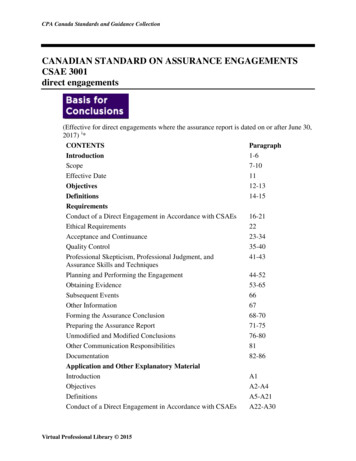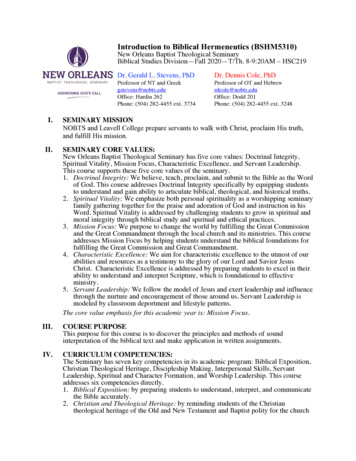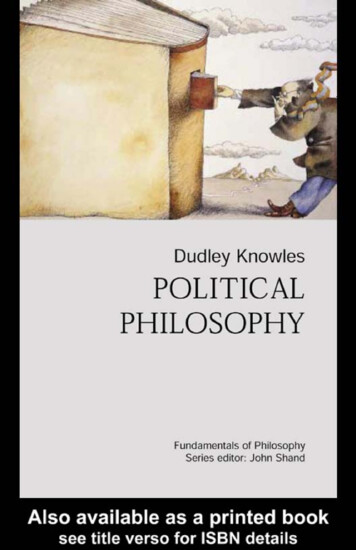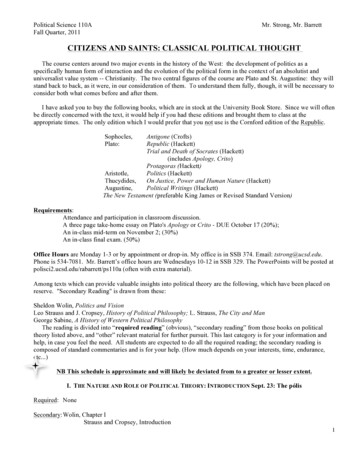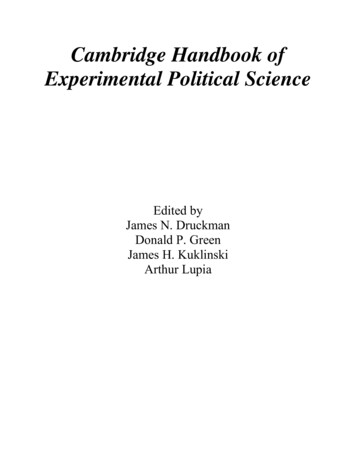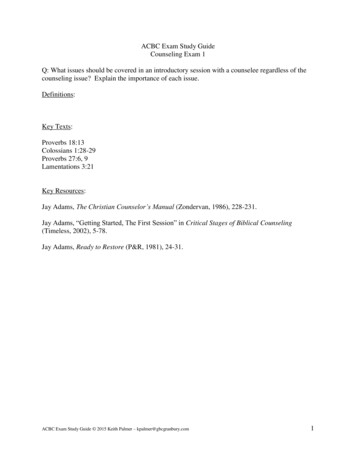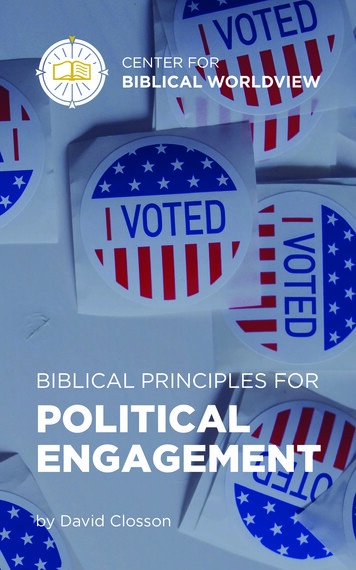
Transcription
BIBLICAL PRINCIPLES FORPOLITICALENGAGEMENTby David Closson
OUR MISSIONThe mission of the Center for Biblical Worldview is toequip Christians with a biblical worldview and train them toadvance and defend the faith in their families, communities,and the public square.WHAT WE BELIEVEWe believe that Jesus Christ created all things and rules allthings and that He Himself is truth. We believe the Bible isGod’s inerrant, infallible, and authoritative Word and thatsubmitting our lives to it should be the goal of everyone whoseeks to follow Christ. Furthermore, we believe that the Bibleoffers the most rational and satisfying answers to life’s mostfundamental questions, including: Why are we here?What has gone wrong with our world?Is there any hope?How does it all end?We believe a person exhibits a biblical worldview when theirbeliefs and actions are aligned with the Bible, acknowledgingits truth and applicability to every area of life.biblical principles for political engagement:worldview, issues, and votingby david closson 2020 family research councilall rights reserved.printed in the united states
BIBLICAL PRINCIPLES FORPOLITICAL ENGAGEMENT:WORLDVIEW, ISSUES, AND VOTINGby David ClossonDo Christians have a moral or biblical obligation to participate ingovernment? Is there a distinctively Christian way to engage inthe political process? Do Christians have a duty to vote, and if so,what principles should inform them while casting their ballots?How should pastors think about politics, and how can theyshepherd their congregations well during an election season?Christians in every generation have debated these questions. Overthe years, several models and suggestions for Christian politicaland cultural engagement have been proposed.1 While theseproposals differ in a few particulars, they all share the commongoal of helping Christians apply biblical principles to the moralissues that shape and influence the world around us.In 1947, theologian Carl Henry warned his post-warcontemporaries that historic Christianity risked losing culturalinfluence because of the church’s hesitancy to apply the gospelto “pressing world problems.”2 In Henry’s day, many evangelicalswere tempted to withdraw or had already withdrawn from thepublic square. As a result, evangelicals were becoming increasinglyinarticulate about the social relevance of the gospel. Thiswithdrawal, as Henry rightly feared, signaled to the world thatChristianity could not compete with other ideologies. Instead ofwithdrawing, Henry encouraged Christians to engage the publicsquare by applying the fundamentals of their faith to the full rangeof issues to which the gospel speaks—including government andpolitics, the sphere that fundamentally orders people’s public lives.1
Thankfully, many Christians in the mid-20th century followedHenry’s lead, pursuing a path of active engagement with theworld. However, the rise of secularism and the sexual revolution’srepudiation of Christian sexual ethics have steadily pushed biblicalprinciples to the periphery of the public square over the last severaldecades. As a result, it is not uncommon for today’s Christiansto be uninformed or confused about how their faith ought toinfluence their public engagement.Moreover, we live in a time of acute political polarization,exacerbated every election cycle by a 24-hour barrage of candidateadvertisements on every communication platform. Unfortunately,the toxic tone and extremely partisan nature of our political systemdiscourage many Christians from studying what the Bible teachesabout government and considering how faith should inform one’sview of politics.Some say that Christians ought to be wary of associating tooclosely with elected officials or political parties because it risksconflating the responsibility of the church with that of thestate.3 They ask: if God is sovereign and controls the heart ofthe king (Prov. 21:1), why risk compromising our gospel witnessby getting involved in something so divisive? Others maintainthat Christians ought to be heavily involved with politicians andpartisan politics. They say: because politics are so important, it isworth investing significant resources to educate and mobilize thecongregation for political activity.Which approach is correct? Both have good intentions. However,if taken to extremes, both approaches are problematic. The formercan cause us to withdraw from the public and political space.The latter threatens to obscure the purpose of the church byelevating politics to a level of importance God never intendedit to have. Scripture advocates neither total withdraw fromthe political process nor overinvestment in the political arena.The gospel applies to all areas of life, and the Bible instructs usabout government and political authority. Thus, we need a third2
approach, a model in which actively engaged Christians faithfullyapply biblical principles to the current political challenges. Butwhat does this model look like? What are the principles that canhelp us navigate our divisive political landscape?HOW SHOULD WE MAKE SENSEOF ALL OF THIS?This publication seeks to helpChristians navigate the issueof political engagement from abiblical worldview. It will do this byconnecting the implications of thegospel to the political process. First, we will ponder the “why”of Christian engagement in politics. We will define “politics”and explain why it is something Christians ought to careabout. We will then examine God’s Word to see if thebiblical worldview offers a framework or set of principles thatcan help us navigate the field of politics. Second, we will consider the “how” of Christian engagementin politics. We will discuss the role of government, voting,America’s two-party system, party platforms, and somepublic policy issues on which the Bible speaks very clearly. Finally, we will address how pastors can navigate sensitivemoral questions and shepherd their congregations well,acknowledging that within our churches exists a diversity ofopinion on many issues, including public policy.3
WHAT IS “POLITICS?”Definitions are crucial for mitigating confusion. For many,the term “politics” is synonymous with deception, conflict, anddivision and invokes images of candidates clashing on TV or anasty campaign ad denouncing an opponent. However, narrowlyinterpreting politics to refer to politicians, campaigns, or anapparatus of the state is a truncated view.POLITICS, PROPERLY UNDERSTOOD, IS ABOUT HOWGROUPS OF HUMANS ORGANIZE THEIR AFFAIRS.The word “politics” comes from the Greek word “polis,” whichreferred to Greek city-states (political entities ruled by a bodyof citizens). Significantly, for the ancient Greeks, politics was“concerned with the struggle over the control and distribution ofpower across a range of sites.”4 It was not limited to the domainof the state. Thus, politics, properly understood, is about howgroups of humans organize their affairs—whether a homeschoolco-op’s decision of where to host meetings, a group of neighborsdeciding that trash needs to be picked up off their street, or anagreement between neighbors to watch each other’s houses whileon vacation. In this sense, politics is intimately connected tocommunity—how we relate to other people—and inextricablefrom the concept of loving one’s neighbor. If we convinceourselves that politics only deals with a narrow subset of clashingpoliticians, and thus choose to withdraw from politics at large,society—and our neighbors—will be worse off.WHY SHOULD WE CARE ABOUT POLITICS?Why should Christians seeking to live out their faith care aboutpolitics? Although not explicitly stated, there seems to be anassumption in some circles that politics is inherently defiled, and4
that political activism is inappropriate for those serious about thegospel. This view fits into what theologian Wayne Grudem callsthe “Do Evangelism, Not Politics” approach to civic engagement.5Adherents of this view suggest that Christians should exclusivelyfocus on sharing the good news and discipling others in the faithbecause Jesus’ final command was to make disciples (Mat. 28:1620). In other words, because political engagement does not leadsomeone to faith in Christ, it is not considered a top priority.However, upon closer examination of Scripture, this objectionfails to account for a broader perspective of politics, one thatincorporates how people order their lives and affairs and thereality that the Christian worldview has much to say aboutcivic responsibility. Moreover, the objection does not considerthe responsibility Christians have to steward the blessings andopportunities entrusted to them. Because voting is a matterof stewardship, Christians living in a democratic republicshould seek to vote in a way that honors God and advances thewellbeing of their neighbor.THE BIBLE TEACHES THAT GOVERNING AUTHORITIESHAVE BEEN INSTITUTED BY GOD (ROM. 13:1-7).The Bible teaches that government is appointed by God. InRomans 13:1-7, Paul describes the governing authoritiesas “ministers of God” and says they are responsible foradministering civil justice. Although God is sovereign, hechooses to use human governments to carry out his will inthe civil sphere. A biblical basis for government is also foundin Genesis 9, where God provides general authorization foraction against murderers (Gen. 9:5-6).6 This passage impliesthat communities must form or support governments capable ofadministering justice.5
Thus, the important role of government is one reason whyChristians should care about the political process. Governmentwas God’s idea, and Christians should think about it and engagewith it in a way that is consistent with its God-ordained purpose.A second reason Christians should care about politics is that theBible contains numerous examples of God’s people engaging inpolitics as part of a holistic approach to ministry that meets bothspiritual and temporal needs.The Old Testament provides examples of faithful politicalengagement. For example, Joseph and Daniel served in foreignadministrations and used their influence to implement policiesthat benefited society. In the case of Joseph, during a devastatingfamine (Gen. 45:9-12), God used his position in the Egyptiangovernment to protect and provide for his extended family (whowould become the future nation of Israel). Likewise, QueenEsther used her influence in the Persian government to save theJewish people from a state-sanctioned genocide (Esther 8).Elsewhere, the prophet Jeremiah instructed the exiles in Babylonto seek the welfare of their new city. He also commanded themto pray for the city, “for in its welfare you will find your welfare”( Jer. 29:7). A thriving society would benefit God’s people as wellas the city’s inhabitants.In the New Testament, Jesus engaged in holistic ministry,caring for the physical and spiritual needs of people; feeding thehungry and caring for the sick were extensions of the messagehe preached. Paul also advocated a comprehensive approach toministry: “As we have opportunity, let us do good to everyone”(Gal. 6:10). Also: “For we are his workmanship, created in ChristJesus for good works, which God prepared beforehand, that weshould walk in them” (Eph. 2:10).The exhortation to engage in “good works” has public significanceand is, therefore, inescapably political. Decisions made by thoseserving in government positions have a substantial impact onpeople’s lives. Consequently, a Christian worldview recognizes6
THE BIBLICAL ADMONITION TO ENGAGE IN “GOODWORKS” HAS PUBLIC SIGNIFICANCE AND IS THEREFOREINESCAPABLY POLITICAL.that the “good works” of believers must include every area of life—including politics, an area with massive implications for Christianevangelism, missions, and the freedom to preach the gospel.Facing charges of sedition, Paul exercised his right as a Romancitizen and appealed to Caesar (Acts 25:10). Evidently, theapostle was comfortable working within the political and legalsystem of his day to pursue justice against false accusations.Finally, Paul instructs Timothy: “First of all, then, I urge thatsupplications, prayers, intercessions, and thanksgivings be madefor all people, for kings and all who are in high positions, thatwe may lead a peaceful and quiet life, godly and dignified inevery way” (1 Tim. 2:1-2). Christians are to pray for their leaderswhose decisions can advance or inhibit their ability to lead godlyand dignified lives.In summary, as the means by which we order our sharedlives, politics occupies a significant place in society and isan unavoidable, central area of Christian concern. Becausegovernment and its laws are an inextricable part of our lives,there is no way to avoid some level of involvement. This is truefor Christians, who, though “sojourners and exiles” (1 Peter 2:11)in this world, are nevertheless citizens of the “City of Man” aswell as the “City of God.” Christians ought to endeavor to begood citizens of both cities and leverage their influence for theadvancement of laws, policies, and practices that contribute tothe flourishing of our neighbors.Thus, Christians have a biblical obligation to engage in politics andthe political process. The question now is: What is the right wayto engage?7
HOW SHOULD CHRISTIANSENGAGE IN POLITICS?How should Bible-believing, gospel-loving Christians exercisetheir political responsibilities? This question has been raised bysome prominent evangelical leaders in recent years. These leadershave expressed concern with the current divisive, coarse nature ofAmerican politics and have offered suggestions for engaging inthe political process.AVOIDING POLITICS ALTOGETHER IS A TACITENDORSEMENT OF THE STATUS QUO, WHICH MIGHTINCLUDE SOCIAL CONDITIONS THAT PERPETUATEFLAGRANT INJUSTICE.Much of their advice is helpful. For example, one pastor stated,“to not be political is to be political,” thereby rebuking thosewho avoid political conversations for fear of being perceived as“too political.”7 As he rightly notes, avoiding politics altogether isa tacit endorsement of the status quo, which might include socialconditions that perpetuate flagrant injustice. Historical examplesinclude 19th-century churches that refused to denounce slaveryand mid-20th-century churches that remained silent on JimCrow laws. By refraining from becoming “too political,” thesechurches were de facto supporters of evil institutions and laws.A second example is the Church of England in South Africa’s(CESA) response to apartheid (1948-1994). Although theChurch sought to take an “apolitical” stance, this pretense ofneutrality allowed the CESA to be misled into accepting a social,economic, and political system that was cruel and oppressive.8By trying to be apolitical, the church effectively sanctioned asystem that tolerated profound injustice. The German church’s8
capitulation to the Nazis in the 1930s represents a similar failure.By not denouncing Hitler’s explicitly anti-Christian ideology,pastors failed to shepherd their churches during a time whenfaithful Christian discipleship was sorely needed.During a recent election cycle, a prominent Christian leaderencouraged pastors to engage in the political process by prayingfor leaders and preaching on controversial issues as they arise inthe course of preaching through the Bible. However, he claimedthat it is unwise to provide voting guides to church membersor host voting registration drives in the church lobby. Heargued these measures have the effect of limiting the number ofpeople who feel “comfortable at our church.”9 This perspectiveacknowledges that politics is one of many ways to love ourneighbors, but cautions that the political process comes withits own set of potential pitfalls and churches should, therefore,be wary of becoming too entangled with politics and elections.Those holding to this view believe that church leaders shouldaddress moral questions in sermons and lead their congregationsin prayer for those in positions of authority—while leaving mostpolitical issues to the individual consciences of their members.Despite helpfully framing some of the questions related toChristian civic responsibility, this advice has limited realworld application because it fails to carry ideas to their logicalconclusion and to describe practical action steps. Theserecommendations fail to grapple with specific issues, theconsequences of ideas, and the reality of our two-party system.10We should never equate the church’s mission with the platformof a political party. But should Christians, and especially pastors,do more than call for cordial discourse and preach on a few moralissues? Is there an ethical imperative for Christians to vote, and ifso, what biblical principles should guide us when we vote?9
SHOULD CHRISTIANS VOTE?Should American Christians vote? To answer this question, wemust first understand government’s God-ordained authority,America’s unique form of government, and how theology mightinform our voting.As we previously noted, oneChristian leader recentlyexpressed his discomfort withhosting voter registration drivesand providing voter guides tohis congregation.11 Althoughthis leader believes that “votingis a good thing,” he neverthelessbelieves it is imprudent forthe church as an institution todo anything beyond prayingfor candidates and preachingon moral issues. Despite thispastor’s good intention to safeguard his church’s mission andwitness, this approach falls short of what fully realized Christiandiscipleship requires. If the gospel has implications for all areasof life, including politics, should not pastors strive to ensure theirmembers are equipped (i.e., registered to vote) and sufficientlyinformed to faithfully engage in the public square?CHRISTIANS ARE STEWARDS OF THE BALLOT BOX,JUST LIKE WE ARE STEWARDS OF EVERYTHINGELSE GOD HAS GIVEN US.10
In a constitutional republic like the United States, the locusof power is the citizenry; the government derives its authorityfrom the people. As Alexander Hamilton explained in FederalistPaper 22, the consent of the people is the “pure original fountainof all legitimate authority.”12 In the United States this principleis foundational to our government, and provides citizens withincredible opportunity and responsibility. Unlike billions ofpeople around the world, Americans, through the ballot box,control their political future. Indeed, we are stewards of it, as weare stewards of everything else God has given us.For Christian citizens, the implications of America’s form ofgovernment are even more significant when considered alongsidePaul’s teaching on the purpose of government in Romans 13.According to Paul, government is ordained by God to promotegood and restrain evil. God authorizes the government to wieldthe sword for the administration of justice. As one theologianrecently explained, “The sword is God’s authorized gift tohumanity for protecting life.”13From these considerations, a truth with far-reaching implicationsfor Christian political engagement emerges: Voting is anexercise in delegating God-ordained authority. Because powerresides with the people in our republic, when Christians vote,they are delegating their ruling authority to others. In otherwords, by voting, Christians are entrusting their “sword-bearing”responsibility to officials who will govern on their behalf. Seenfrom this perspective, voting is a matter of stewardship; failure tovote is a failure to exercise God-given authority.Therefore, if the act of voting is the act of delegating the exerciseof the sword, pastors should communicate to their members:“This is what Christians should do.” Given the unavoidable roleof politics and the direct, real-world impact that governmentdecisions have on people’s lives, downplaying the responsibility tovote amounts to a failure in Christian discipleship and loving ourneighbors comprehensively.11
Now, some might push back and argue that this conception ofvoting and political engagement overly prioritizes the politicalarena. When reflecting on the Christian obligation to loveour neighbors, they might argue that “political engagement isonly one way of loving our neighbor and trying to be a faithfulpresence in the culture.”14 This is true, but we must not minimizethe significance of government and the role it plays in people’slives. Love of neighbor must be embodied in all aspects of life.Can Christians really care for their neighbors well if they are notengaging in politics, the arena where a society’s basic rights andfreedoms are shaped?Further, given the United States’ far-reaching influence inthe world, how can American Christians love the people ofthe nations well without having a vested interest in how ourgovernment approaches the issue of religious liberty and humanrights worldwide—issues which go to the heart of seeing peoplearound the world as created in the image of God? By voting,Americans determine who will represent the United Statesabroad as well as the values our country will export around theworld. Will America’s ambassadors be stalwart defenders ofreligious freedom overseas? Christians who support missionariesshould care about the state of international religious freedom,an area of advocacy in which the United States exerts significantinfluence. Will abortion, under the euphemism of “familyplanning,” be funded overseas by American taxpayers, or willU.S. foreign policy value the life of the unborn? Again, Americanbelievers, by exercising their right to vote, have a direct say inthese matters.12
PASTORS SHOULD HELP EDUCATE AND EQUIP THEIRMEMBERS TO THINK BIBLICALLY ABOUT POLITICALISSUES, CANDIDATES, AND PARTY PLATFORMS.In light of these considerations, pastors should exhort theirmembers to be involved in the political process and to vote.But voting is not enough. Pastors should also help educate andequip their members to think biblically about moral issues,candidates, and party platforms. Much of this equipping andeducating should be accomplished through the regular rhythmsand liturgies of the church (preaching the Word, corporateprayer, hymnody, etc.). However, for the sake of robust politicaldiscipleship, additional steps should be taken. For somecongregations, this might mean providing access to voter guidesand other educational material. In others, it might mean hostingworkshops or Bible studies on political engagement.Many Christians might get squeamish at these suggestions; if so,we must recall a proper understanding of “politics,” as discussedpreviously—that of deciding how best to organize the affairs ofthe community and love one another. When we realize politicsis, at its core, about how we love our neighbor as we live andorder our lives together, we understand there is no reason to shyaway from becoming informed about how to vote. Rather, wemust embrace the question. We must make room for thoughtfuldiscussion and respectful disagreement on certain issues withinthe body of Christ, but we must not avoid talking about themaltogether. It is not enough to espouse concern for humandignity but not support policies and candidates who will fight tooverturn profound moral wrongs. In a Genesis 3 world plaguedby sin, Christians are called to reverse the corroding effects of thefall wherever they exist. Our decision to cast an informed vote isan attempt to do just that.13
REALITY OF OUR TWO-PARTY SYSTEMAs we seek how best to engage in politics, specifically electoralpolitics, we must grapple with the reality of voting in the currentcontext of our two-party system.When it comes to faithfullynavigating the two-partysystem, there are manycompeting perspectives. Somecontend that Christians oughtto participate in the politicalprocess without identifyingthe church with either party.Political parties typicallyinsist on total allegiance and want their members to embraceevery position in the party platform. Such allegiance can leadto an acceptance of unbiblical policies and an inability to speakprophetically to society. In order to avoid such a contingency(so the argument goes), Christians should be issue-oriented,and seek to address pressing moral concerns regardless of whatparties or party platforms dictate. In other words, Christiansshould persuade party leaders and policymakers of the merits oftheir ideas, rather than accepting an entire party platform andany morally problematic aspects it may contain.Many evangelical organizations and leaders have adopted thisapproach, and rightfully so, because Christians should neverconflate the message of the church with that of a political party.We must evaluate political positions in light of the Bible, not theother way around.However, while the church should never tie itself to a specificpolitical party or movement, this fact should not be used as anexcuse to not speak truthfully about where the two major partiesstand on the most fundamental moral issues. Withdrawal fromthe political process and full assimilation into a party are equally14
unacceptable positions. So, Christians must adopt an issue-basedapproach that is clear and honest about where the major partiesand candidates stand. This approach allows for prophetic distancebut does not pretend the two major parties (or their platforms)are morally equivalent on every issue.Historically, the last president not affiliated with either theDemocratic or Republican parties was Millard Fillmore, amember of the now-dissolved Whig party who served as the13th President of the United States (1850-1853).15 For betteror worse, America has a two-party system, and Christians mustacknowledge and operate within this system. While the goal ofChristians engaging in politics should be to persuade membersof both parties to approach issues from a biblical worldview, wemust decide at election time who to support. So, what biblicalprinciples and political issues should Christians consider whendeciding how to vote? Answering this question will help usdecide who to support come election time.WHAT ISSUES ARE MOST CLEARFROM SCRIPTURE?Christians convinced of their responsibility to vote and engagepolitically need to be aware of the issues at stake and know wherethe political parties stand. But more importantly, Christiansmust be grounded in what God’s Word teaches. Thus, whatfollows is a survey of biblical teaching on a few pertinent moralissues that are currently being debated by Christians who wantto navigate the political process faithfully. Some issues withmoral implications include abortion, marriage, race, and povertyalleviation. Because the Republican party is commonly perceivedas holding a more biblical view on the first two issues and theDemocratic party on the latter two, we will pair abortion andmarriage together and race and poverty alleviation together inour discussion.15
Abortion and Marriage/SexualityOn abortion and the personhood of the unborn, the Bible isclear—life begins at conception and abortion is murder (see Ex.21:22; Ps. 139:13-16, 22:10, 51:5-6; Job 3:3; Jer. 1:4-5; Isa. 49:1;Luke 1:39-45; Gal. 1:15).16 Likewise, on marriage, the Bibleis straightforward and defines marriage as a lifelong covenantbetween a man and a woman (Gen. 2:24, Mat. 19:5, Mark 10:69, Eph. 5:22-23). Scripture is also unambiguous regarding themoral status of homosexual conduct (Gen. 19:1-5; Lev. 18:22,20:13, Rom. 1:24-28; 1 Cor. 6:9-11;1 Tim. 1:10-11).17 Thus, onboth life and sexuality, the Bible is unequivocal.WHEN IT COMES TO THE ISSUES OF ABORTION ANDMARRIAGE/SEXUALITY TODAY, THE DIVIDE BETWEENTHE TWO PARTIES COULD NOT BE STARKER.When it comes to the issues of abortion and marriage/sexualitytoday, the Republican and Democratic national party positionsfundamentally disagree. Concerning marriage, the 2016Republican Party platform states, “Traditional marriage andfamily, based on marriage between one man and one woman,is the foundation for a free society and has for millennia beenentrusted with rearing children and instilling cultural values.”18The 2016 Democratic Party platform states that Democrats“applaud [the] decision by the Supreme Court that recognizedthat LGBT people—like other Americans—have the right tomarry the person they love.”1916
On abortion, Democrats have moved away from their formerposition that abortion should be “safe, legal, and rare.”20 Theparty now considers abortion to be a fundamental right thatshould be funded by the government. Whereas, their platformin 1992 included the language: “The goal of our nation mustbe to make abortion less necessary,”21 the 2016 platform stated:“We will continue to oppose—and seek to overturn—federaland state laws and policies that impede a woman’s access toabortion, including by repealing the Hyde Amendment.”22 TheHyde Amendment, first passed in 1976, prohibits the use offederal funds to pay for abortion. The 2016 Democratic platformincluded the first explicit appeal from a major political party torepeal this provision. Four years later, every Democrat who ranfor president, including the eventual nominee, publicly backedrepealing the Hyde Amendment.23The issue of infanticide has also become part of the recentpolitical conversation. Infanticide, the killing of infants bornalive, first entered the political discussion in 2019 when NewYork repealed a section of the state’s public health law thathad protected children born alive during failed abortions. Theupdated law also allows for abortion even after 24 weeks ofpregnancy if the mother’s health is in jeopardy. However, the“exception to health” provision is not restricted to a physicaldefinition and can include psychological and emotional health(subject to the medical judgment of the abortion provider).Thus, the new law is so broad that abortion is now legal until themoment of birth in New York.24Democrats have been outspoken on this issue. Following thepassage of New York’s abortion law in 2019, Delegate KathyTran (D) introduced a similar bill in Virginia to legalize abortionthrough the third trimester.
gospel. This view fits into what theologian Wayne Grudem calls the “Do Evangelism, Not Politics” approach to civic engagement. 5 Adherents of this view suggest that Christians should exclusively focus on sharing the good news and discipling others in the faith because Je
